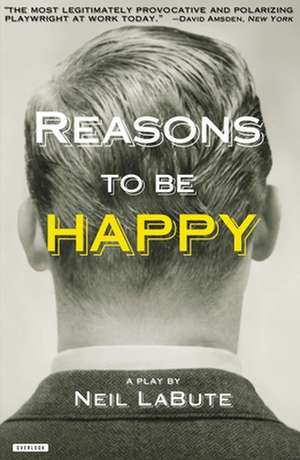Reasons to Be Happy
Autor Neil LaButeen Limba Engleză Paperback – 4 iun 2013 – vârsta de la 18 ani
Reasons to Be Happy is the companion piece to Neil LaBute's widely praised, 2009 Tony-nominated reasons to be pretty. Reasons to Be Happy features the same four characters--Greg, Steph, Carly, and Kent--picking up their lives three years later, but in different romantic pairings as they each search desperately for that elusive object of desire: happiness. New York City's MCC Theater will produce the world premiere in May 2013.
Preț: 77.73 lei
Nou
Puncte Express: 117
Preț estimativ în valută:
14.87€ • 16.21$ • 12.53£
14.87€ • 16.21$ • 12.53£
Carte indisponibilă temporar
Doresc să fiu notificat când acest titlu va fi disponibil:
Se trimite...
Preluare comenzi: 021 569.72.76
Specificații
ISBN-13: 9781468307214
ISBN-10: 1468307215
Pagini: 106
Dimensiuni: 139 x 209 x 8 mm
Greutate: 0.15 kg
Editura: Overlook Press
ISBN-10: 1468307215
Pagini: 106
Dimensiuni: 139 x 209 x 8 mm
Greutate: 0.15 kg
Editura: Overlook Press
Recenzii
"Mr. LaBute is writing some of the freshest and most illuminating American dialogue to be heard anywhere these days." --Ben Brantley, The New York Times
"Neil LaBute is the most legitimately provocative and polarizing playwright at work today." --New York Magazine
"The play twists continually, and the truth is always one twist away. LaBute is such a skillful writer--edgy, funny, outrageous . . . " --Financial Times
"Neil LaBute is the most legitimately provocative and polarizing playwright at work today." --New York Magazine
"The play twists continually, and the truth is always one twist away. LaBute is such a skillful writer--edgy, funny, outrageous . . . " --Financial Times
Notă biografică
Neil LaBute is arguably the most challenging, provocative, and acclaimed playwright of his generation. In works like bash, The Shape of Things, Fat Pig, and reasons to be pretty, he superbly engages with such themes as men and women, sex and power, deception and manipulation, with the humane sensibility of an artist who, as John Lahr wrote in The New Yorker, "does not trivialize darkness but treats it with proper awe."
